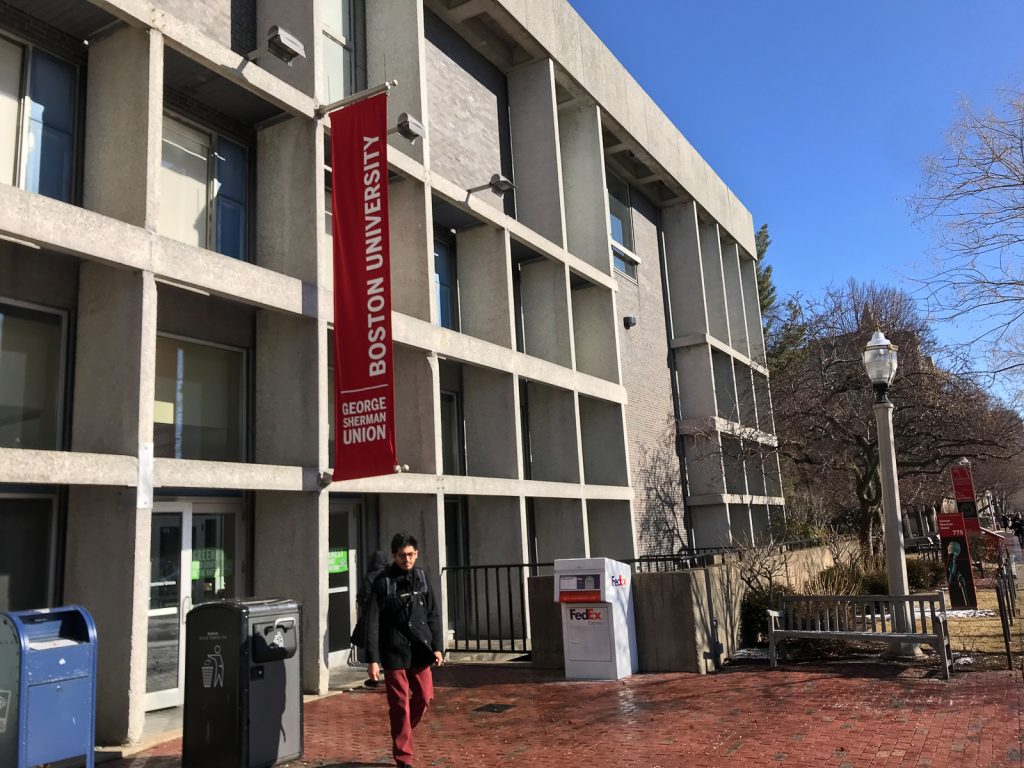
By Sophia Falbo
Boston University News Service
It’s May 2015. I hold my mom’s hand as we stroll down Commonwealth Avenue. She points out Warren Towers, where she lived her freshman year, and lets me peek inside Agganis Arena as the ice is being cleaned. She takes my brother and me into the bookstore, where I buy a “BUtiful” long-sleeve gray shirt.
“This could be all yours someday,” my mom said.
I’m a second-generation terrier, proudly carrying on my family’s almost four-decade legacy. My mom minored in journalism, and I’m majoring in it. To say that she has rubbed off on me would be an understatement.
Slideshow: Sophia Falbo poses in front of Boston University buildings and with her mother in various photos. Images courtesy of Sophia Falbo | Boston University News Service
Boston University Student Body President Dhruv Kapadia sent an email to the BU community on Oct. 26 announcing that the university will no longer consider legacy status in admission decisions. The letter was sent after a meeting with BU’s Vice President Christine McGuire and Senate Chair Hanna Dworkin. They said in an email that the decision was sparked by the Supreme Court’s decision to ban race-based admissions decisions in June.
“I can speak as a first-gen college student,” Kapadia said. “When you get asked on your common application if you have alumni relation from when you’re applying to school, you immediately feel discouraged, and you feel like you’re inherently at a disadvantage compared to students who might have alumni relation.”
Like Kapadia, Executive Director of the Newbury Center Maria Erb said that first-generation students were hindered compared to legacy students’ ability to network and foster connections.
“It just eliminates another barrier that helps level the playing field for first-gen college students as they’re going into universities and colleges,” Erb said.
“This could be all yours someday”
While students I talked to would agree with both Erb and Kapadia, current BU legacy students, such as Sydney Topf, have a different perspective on this decision. Topf got into BU during the Regular Decision period. She said that since committing to BU in May 2021, her relationship with her mother is much stronger because of their shared Terrier experiences.
“When I got into BU, that was the first moment I really realized my mom went to this school, and I had the possibility of continuing that,” Topf said.
However, Topf said that despite her mother and cousin being alumni, BU wasn’t her first choice. Her dream school was the University of Pennsylvania, which she said has a much bigger sense of school pride and alumni connections.
I relate a lot to Topf because while my mother went to BU and raved about her amazing experience for as long as I can remember, she never forced it onto me. I even put it towards the bottom of my list while touring colleges. Though, like Topf, my mom burst into tears when I opened my acceptance email in March 202, and I too have felt a much deeper connection with her since my first stroll down Commonwealth Ave. with my roommate during freshman year.
There’s always stress and anxiety relating to the college admissions process, especially due to the fact that applicants never truly know what occurs behind closed doors. I believe BU is taking a step in the right direction by publicly stating they will no longer consider legacy in their admission decisions, though more transparency is needed between the BU community and the admissions department.
Take, for example, Topf’s dream school, the University of Pennsylvania. Topf said many legacy students there, who have alumni in their families, have been told their whole lives how great of a school it is and how they should attend to feel that Quaker pride. BU doesn’t have that same Terrier enthusiasm. Topf said the problem with BU is that they don’t have enough events, like Homecoming, to bond students and alumni.
“I feel like legacy admissions aren’t really talked about,” Topf said. “It’s more to see if legacy is a thing at BU, like ‘Did they drink the BU Kool-aid their entire lives?’”
As BU is sifting through the next cycle of applications, we’ll have to wait to see what percentage of the Class of 2028 comprises legacy students. No matter the outcome, I’m a proud Terrier with a proud Terrier mother, and I hope other children of BU alumni get to share similar experiences with their parents.








